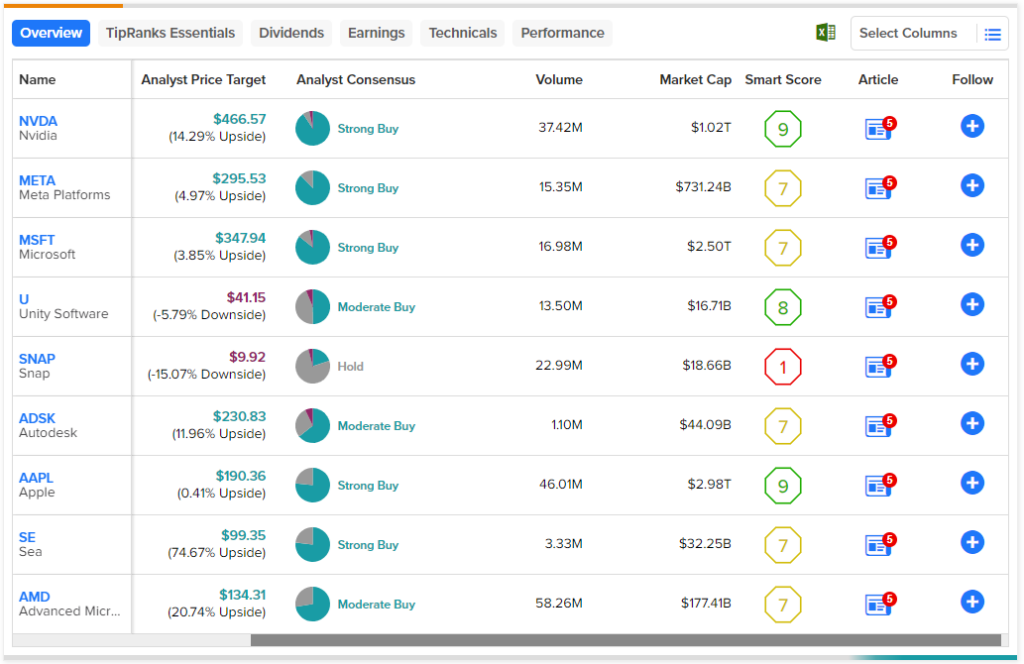The Metaverse is here to stay, as evidenced by Apple’s (NASDAQ:AAPL) recent entry into the VR/AR space. The Apple Vision Pro is unique from previous attempts because of its focus on productivity, which is quite timely. The possibilities of using metaverse and VR for education and training are astounding.
Meet Your ETF AI Analyst
- Discover how TipRanks' ETF AI Analyst can help you make smarter investment decisions
- Explore ETFs TipRanks' users love and see what insights the ETF AI Analyst reveals about the ones you follow.
As with any new technology, there’s often a lot of hostility to the growing phenomenon of the Metaverse, which essentially involves experiencing virtual worlds powered by Virtual or Augmented Reality goggles.
Critics often focus on the Metaverse as an escape from reality — a place to do things you’d never be allowed to in the real world. For people struggling in their real life, the Metaverse could be a destructive escape, similar to alcoholism and drugs.
However, this overly-negative interpretation misses all the many ways in which the Metaverse can help augment and improve our “real-world” lives. Specifically, there’s a large number of ways we can leverage metaverse environments to improve our understanding of the world.
Simulating Real-World Situations to Practice
In the Matrix movies, when Neo has to learn how to bend the simulation to his will, he first does it through special training programs that recreate particular situations. These are low-stakes environments that are specially made for this purpose. They were disconnected from the main Matrix and allowed Neo and Morpheus to practice absurdly long jumps, martial arts, and many other skills.
It will be a long while before the Metaverse can reach that level of realism, but in the meantime, there’s no reason why we can’t use it for more mundane training.
A good example is to practice various social interactions and soft skills. For example, most people aren’t really born as leaders and may need some time to feel confident in their new shoes of a management position or similar.
With the Metaverse, it’s possible to create a “game” of communication where the player must face an emotionally charged situation. The benefit of the Metaverse is that the situation will feel very immersive and real but won’t have any real-world consequences. This can be done both with fully-simulated training with Non-Playable Characters (NPCs), which could be powered by AI, or with other real-life humans who are looking for the same kind of practice.
The Metaverse can also kick our immersion capabilities up a notch for historical or cultural settings.
For history buffs, there is nothing more satisfying than a well-made game or TV show set in a particular era. Metaverse-powered platforms can help the user feel as if they’re there, recreating historical and geographical settings with full 3D vision and interactivity. This will obviously require high-quality rendering engines, but it is well within the realm of today’s technology.
Similarly, language learners may have the perfect practice setting. It is well known that the best way to learn a new language is by being fully immersed in it. In essence, to move to the country where that language is spoken. But moving to new countries isn’t really practical to most due to immigration laws and life circumstances. It’s a luxury only afforded to the wealthy and/or young, who can, for example, join student exchange programs.
Enter the Metaverse; by recreating a dynamic and interactive context in the target language, the learner can practice listening and speaking without ever leaving their bedroom.
Masterclass, Turbocharged
The Metaverse can be a place to learn skills from experts in their field, be they regular teachers or “celebrity” experts.
Sure, video calls can be an “easier” way to take long-distance communication, but they’ve always felt off and awkward compared to a real-life meeting. They’re ok for remote business meetings, but building true relations and rapport is nearly impossible. The primary reason for that, according to psychologists, is the lack of body language cues and immersiveness.
This is where an immersive metaverse can dramatically help with building true two-sided interactions between teacher and student, as well as co-workers. The immersiveness benefit is clear, and with time, we should be able to recreate a good portion of the body language cues we use in communication.
With the Metaverse, we can also create unique celebrity-fan encounters that are easier than physical travel and more fulfilling than a basic video call.
Think Gordon Ramsay setting up cooking challenges, Quentin Tarantino talking about some funny behind-the-scene events, or Neil DeGrasse Tyson chatting with you about black holes. By the way, Ramsey has already stepped up to the plate in The Sandbox (a virtual-gaming world)!
What’s more, by combining the Metaverse with AI deep-learning models, the same experience can be achieved for masters of their domains that are no longer with us, like in the case of the video game Byte City “bringing back” Bruce Lee to teach his fans martial arts.
To honor the 50 years anniversary of his passing, Byte City has collaborated with Lee’s daughter to give fans the chance to interact with a detailed avatar of the legendary fighter in their metaverse, creating a unique social gathering that wouldn’t be possible in real life and a learning experience.
The Future of Learning
Much of the narrative around the Metaverse has been shaped by COVID-era thinking — when it was common to think that it was “the new normal” and that social interactions would never be the same. Because of that focus, when it turned out that we could and would indeed go back to normal, the Metaverse’s popularity steeply fell off.
But the Metaverse goes beyond that, and with recent advances in technology, these unique experiences could go mainstream in just a few years. The Metaverse has great educational potential, and those taking advantage of it can learn new skills in a more interactive, immersive, and accessible environment than ever before.
Finding Metaverse-Related Stocks
If you’re bullish on the Metaverse, check out the top metaverse stocks comparison page on TipRanks, where you can compare numerous stocks based on key criteria. Click on the image below to learn more.

















